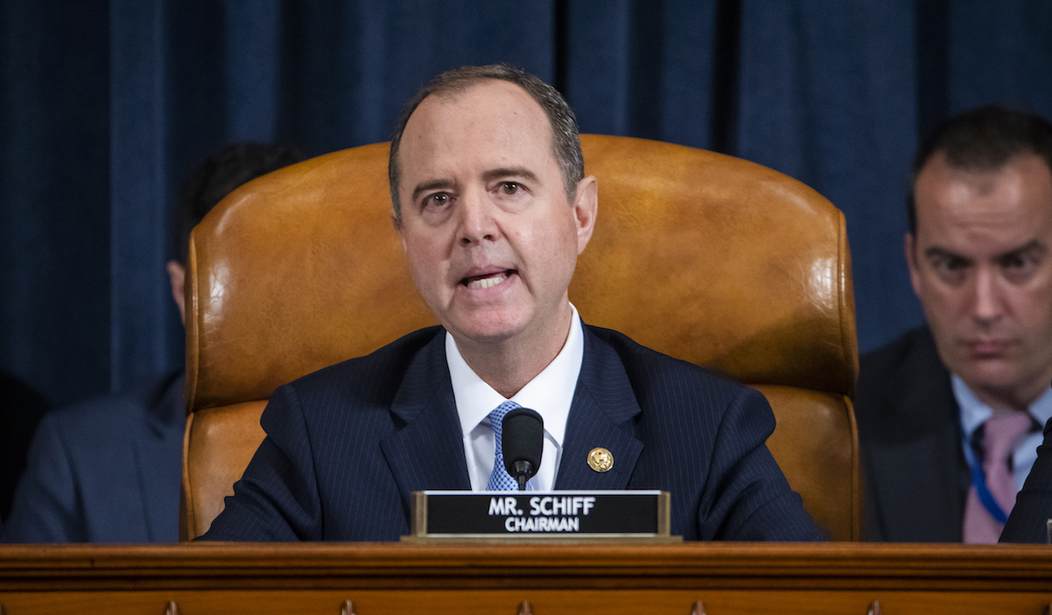Now we learn that Congressman Schiff was able to obtain the personal phone call logs of his political opponents, including Congressman Devin Nunes, Rudy Giuliani and others. What isn’t clear is how they were obtained, with or without a subpoena.
According to Schiff, “the blowback has only come from the far right.” He’s partly correct, as America in general, is likely far more interested in Sunday’s NFL scores than an outright abuse of power by Schiff and a violation of the Fourth Amendment.
The phone call logs Schiff has now made public, showing who called who, and for how long the conversations lasted is exactly the kind of data collection Eric Snowden warned us about. Given what was at stake, it's unfathomable that AT&T didn’t raise an objection to a House committee subpoena or allow its customers to file an objection. The fact is, AT&T and other American telecom carriers have their own quid pro quo issues that have been going on for years in exchange for lucrative government contracts.
Based on the latest details that were available before publication of this column, this subpoena did not involve any court supervision whatsoever. To put this House subpoena into context, former Obama administration Attorney General Holder has yet to respond to House investigative subpoena’s related to the highly-questionable “Fast and Furious” scandal. Apparently, House investigative subpoenas carry non-existent enforcement mechanisms, otherwise Holder, who was held in contempt of Congress, would have at some point did the perp walk for all the world to see.
In Monday’s House Judiciary Committee impeachment hearing, much was made over who “matched” the phone numbers from one phone to another. AT&T can easily supply the meta data with who owns each number that initiated the calls and who owns the number who received the call. Dumped into a simple CSV or Excel file, anyone with 10 minutes of Excel experience can scan and match up the names and numbers.
Recommended
The fact that the federal government harvests the meta data associated with our personal phone calls isn’t new, despite how many times former National Intelligence Director James Clapper lies about it under oath, or regurgitates it nightly as a political media analyst. It’s also not a secret any longer how cozy the American telecom carriers have become with the intelligence community over the years who are more than willing to sell out their customers’ privacy in exchange for secretive lucrative government contracts.
The average American consumer who signs a retail service contract with AT&T, Verizon, Sprint or other telecom provider has no contractual guarantees to be notified of a “warrantless search” request from a federal government agency on their call records. Even the largest corporations who engage knowledgeable consultants and lawyers are seldom successful at negotiating a notice requirement so that they may object to, or opt out of, this disclosure.
In the event there actually is a warrant issued for these records, it requires the agency, prosecutor or law enforcement official to go through the same civil liberty precautions and steps as if those same agencies were to pound on your front door with a warrant to search your home. What we can’t be assured of, or if it even occurred, is any modicum of integrity in the FISA court process as proven in the Mueller Report and now the impeachment inquiry.
It appears AT&T acquiesced to Schiff without a court order, willing supplying a Congressman in charge of the powerful Intelligence Committee to provide call records on political opponents with little or no judicial oversight. After all, surely AT&T’s wouldn’t risk its recent huge $3.3 Billion contract with the NSA by refusing to comply with Schiff’s requests?
After the events of 9/11, the government and our elected representatives were convinced that Americans would be willing to trade their privacy for increased security, leading to the National Defense Authorization Act (NDAA) and The Patriot Act. Those who were concerned about the potential abuse of various unconstitutional elements of those two sweeping and intrusive laws have proven to be right.
A federal government made up of politicians, career bureaucrats and ideologues simply cannot be trusted with the keys to unlock the Constitution simply because it serves their political interests. If there is one thing that the Russian Hoax and the impeachment circus prove it's that the intelligence community cannot be trusted.
Congressman Schiff should be investigated and the method used to obtain these phone records should be exposed and scrutinized. Federal law should be changed, requiring the telecom carriers to notify their customers of warrantless searches so they may have the opportunity and the right to object.
The telecom companies, who have specifically informed me in past contract dealings on behalf of my clients and prior to Snowden’s disclosures that the government searches are so massive and widespread that they could not “operationalize” a contractual notice requirement to inform a specific customer that an agency had requested their phone, email or text records. They then disclosed to me they began “automatically” turning over meta data records years ago, to which Clapper was specifically queried and purposely lied.
America should pay attention. Lost in all the white noise over a failed Russian hoax and an unpopular impeachment inquiry, our civil liberties and Fourth Amendment rights are being violated on a daily basis, in exchange for government contracts.
Giving the federal government easy access to spy on American citizens is Anti-American. Our intelligence community is fundamentally broken and the Constitution is an afterthought.
Maybe we are looking for the obvious quid pro quo in the all the wrong places?
David Thomas Roberts is a CEO, serial entrepreneur, inventor, bestselling author and public speaker. Roberts has negotiated over $12 Billion worth of global telecom contracts on behalf of his corporate clients.

























Join the conversation as a VIP Member